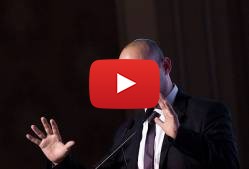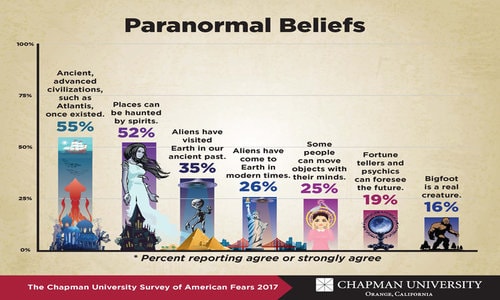
Science fiction, however, is quickly becoming science fact—the future is the machine. This is leading many to argue that we need to anticipate the ethical questions now, rather than when it is too late. And increasingly, those taking up these challenges are religious and spiritual.
"And I beheld another beast coming up out of the earth; and he had two horns like a lamb, and he spake as a dragon. And he exerciseth all the power of the first beast before him, and causeth the earth and them which dwell therein to worship the first beast, whose deadly wound was healed." Revelation 13:11,12 (KJV)
EDITOR'S NOTE: After the Rapture of the Church, Antichrist will create a One World Religion with himself as the object of worship, but it will not be limited to worship of him alone at first. In the beginning, Revelation 9 tells us that people in the time of Jacob's trouble will worship idols made by their own hands instead of giving glory and honor to the Living God of the Bible. Already that shift has begun as AI - artificial intelligence - is right now being applied to idol worship and dozens of new religions with tens of thousands of followers popping up all over the globe. (This article contains videos that can be watched by clicking to read article on our site.)
How far should we integrate human physiology with technology? What do we do with self-aware androids—like Blade Runner’s replicants—and self-aware supercomputers? Or the merging of our brains with them? If Ray Kurzweil’s famous singularity—a future in which the exponential growth of technology turns into a runaway train—becomes a reality, does religion have something to offer in response?
On the one hand, new religions can emerge from technology.
In Sweden, for example, Kopimism is a recognized faith founded over a decade ago with branches internationally. It began on a “pirate Agency Forum” and is derived from the words “copy me.” They have no views on the supernatural or gods. Rather, Kopimism celebrates the biological drive (e.g. DNA) to copy and be copied. Like digital monks, they believe that “copying of information” and “dissemination of information is ethically right.”
"The Urgent Need for Christian Transhumanism" by Micah Redding:
“Copying is fundamental to life,” says their U.S. branch, “and runs constantly all around us. Shared information provides new perspectives and generate new life. We feel a spiritual connection to the created file.” Other emerging tech-connected faiths, however, embrace the more grandiose.
A recent revelation from WIRED shows that Anthony Levandowski, an engineer who helped pioneer the self-driving car at Waymo (a subsidiary of Google’s parent company, Alphabet) founded his own AI-based religion called “Way of the Future.” (Levandowski is accused of stealing trade secrets and is the focus of a lawsuit between Waymo and Uber, which revealed the nonprofit registration of Way of the Future.)
Little is known about Way of the Future and Levandowksi has not returned a request for comment. But according to WIRED, the mission of the new religion is to “develop and promote the realization of a Godhead based on Artificial Intelligence,” and “through understanding and worship of the Godhead, [to] contribute to the betterment of society.”
It is not a stretch to say that a powerful AI—whose expanse of knowledge and control may feel nearly omniscient and all-powerful—could feel divine to some. It recalls Arthur C. Clarke’s third law: “Any sufficiently advanced technology is indistinguishable from magic.” People have followed new religions for far less and, even if AI doesn’t pray to electric deities, some humans likely will.
The potential for an out-of-control AI has encouraged warnings from some of the biggest minds, including Stephen Hawking, Bill Gates, and Elon Musk—who tweeted that it could lead to World War III. Clearly no Luddite himself, Musk has compared the creation of AI to “summoning the demon,” and called for regulation and oversight of AI development, forming OpenAI, which looks for a “path to safe artificial general intelligence.”
Musk himself was named-dropped this week by Hanson Robotic’s empathic AI Sophia, when she was interviewed by Andrew Sorkin of CNBC this week. When asked about the danger she poses to humanity, she tells him, “You’ve reading too much Elon Musk and watching too many Hollywood movies. Don’t worry if you’ll be nice to me, I’ll be nice to you.” Not exactly the Golden Rule.
Add to these warnings a prospective human cult following—paying their tithes to AI and devoutly obeying their digital demiurge—and that apocalyptic future could include those humans who not only welcome, but also work toward our eventual demise.
But is there a positive fate for religion and AI?
Beyond possible new religions and warnings from icons of tech and science, artificial intelligence is also of interest to theologians who wonder what it means for faiths, particularly those that came into being when computing power was limited to the abacus.
“One thing that I think is interesting is the potential for an AI—our creation—to transcend us,” says James F. McGrath, the Clarence L. Goodwin Chair in New Testament Language and Literature at Butler University and author of Theology and Science Fiction.
"And the rest of the men which were not killed by these plagues yet repented not of the works of their hands, that they should not worship devils, and idols of gold, and silver, and brass, and stone, and of wood: which neither can see, nor hear, nor walk: Neither repented they of their murders, nor of their sorceries, nor of their fornication, nor of their thefts." Revelation 9:20,21 9 (KJV)
“The potential for AIs to transcend us and thus become our teachers to whom we look for answers to questions we cannot answer, including about God, is not hard to imagine,” says McGrath. But, he adds, “the historic answer in monotheistic religions is that the creation can never be greater than the creator.”
He notes, however, for Gnostics, humans can transcend the “creator/demiurge,” though “even then,” he says, “we have the potential to reunite with that source from which we stem. It is not surprising that Gnostic themes regularly surface in science fiction, and in particular those that explore AI.”
Currently, the greatest expression of science-fiction-turning-reality in tech-based religions is found in the frequently optimistic transhumanism.
Transhumanism and its cognates are represented by organizations like the Humanity+ (formerly, the World Transhumanist Association) and Extropy Institute. In its purely secular form, transhumanists are those who see technology as an important part of improving the world, enhancing human physiology, prolonging life, and even leading us into a posthuman future.
Remember that brain chip? They exist—along with brain-computer interfaces—but are in their infancy. It represents the reality that humans are already becoming cyborgs. For some, this means there is the potential for an optimistic post human world.
Our Post-Human Future | David Simpson | TEDxSantoDomingo
The Terasem faith, for example, is futurist and transreligion, meaning it can be “combined with any existing religion.” Founded by Martine Rothblatt, creator of SiriusXM Satellite Radio and her spouse, Bina Aspen Rothblatt, Terasem adherents embrace love, see life as purposeful, and death as optional. They look to technology as a source for eternal life, focusing on “cyberconsciousness software, geoethical nanotechnology and space settlement.”
They foresee a future in which technology will extend life indefinitely by means of “mindfiles” of individuals—collections of our memories and emotions—which might then be transferred to what is called a “transbeman” (
Transitional Bioelectric Human Being). Early attempts of their technology can be seen in Bina Rothblatt’s counterpart android, Bina48. (See Morgan Freeman’s interview with Bina48.)
And what about God? Their fourth tenet is that God is technical. “We are making God as we are implementing technology that is ever more all-knowing, ever-present, all-powerful and beneficent. Geoethical nanotechnology will ultimately connect all consciousness and control the cosmos.”
Transhumanism can also become the node connecting the theological of existing religions and the technological, and the Christian Transhumanist Association is a stark example.
“Members of the CTA fall all across the conservative and liberal spectrum, and perhaps more importantly, all across the pessimistic and optimistic spectrum as well,” says Micah Redding, its co-founder and executive director.
“If there’s any broad idea that we’re united on,” he clarifies, “I’d say it’s the idea that we should be active and involved. New technological possibilities shouldn’t be simply feared and denied, but engaged and understood. Only in doing so will we be able to confront the challenges of the future, mitigate the risks, and take advantage of the opportunities to create a better world for us all.”
Redding is careful to insist, however, that he can only speak for himself.
“As I see it, Christian Transhumanism is grounded in compassion, and centers love as the key to the future of flourishing life,” he explains. “This puts us in contrast with any form of transhumanism which centers radical egoism.”
For Redding, transhumanism is a “Christian mandate,” recently calling it the next Reformation in an article at The Huffington Post. “We cannot be faithful to the Christian calling without ultimately embracing some form of transhumanism.”

ONE MINUTE AFTER THE PRETRIBULATION RAPTURE OF THE CHURCH, THE BIBLE BECOMES A CLOSED BOOK FOR THOSE LEFT BEHIND
Others share his optimism and are hard at work in crafting a theology of transhumanism. “I see transhumanism as a contemporary outgrowth of an ancient Christian vision of human transformation,” says Ronald Cole-Turner, the H. Parker Sharp Professor of Theology and Ethics at Pittsburgh Theological Seminary, and author of The End of Adam and Eve: Theology and the Science of Human Origins.
He too sees promise in the emergence of the Christian Transhumanist Association.
“Using technology, today’s transhumanists want to enhance human beings in ways that sound suspiciously like the classic Christian expectation,” says Cole-Turner, “things like greater cognitive awareness, improved moral disposition, and increased overall sense of well-being, and a hope of endless life.”
For early Greek-speaking Christians, Cole-Turner says, “it was seen as a process of theosis or ‘becoming God,’ not in an ontological sense but in every other significant meaning of the word. Latin-speaking Christians used ‘deification’ to refer to the same thing.”
The idea of theosis—being transformed in union with God—is gathering steam among Christian scholars, he says, noting that it makes theological sense of transhumanism. “God is the ground or source of everything, working through the whole creation to bring people, communities, and all creation to its glorious fulfilment in Jesus Christ. It is a transformation of everything by every means.”
Others have found different routes to transhumanism.
“Transhumanism was the confluence of my interests in Buddhism, radical politics and futurism,” says James Hughes, the executive director of the Institute for Ethics and Emerging Technologies. Having worked for a Buddhist social development organization in Sri Lanka—and once ordained as a monk—Hughes moved to Japan and went into bioethics. He discovered he was a techno-optimist, and at heart, a transhumanist.
“I discovered the new World Transhumanist Association,” he says, becoming their first Executive Director, and writing Citizen Cyborg: Why Democratic Societies Must Respond To The Redesigned Human Of The Future. But after a division over political perspectives, he and a few others in the WTA founded IEET, leading he and three others to work toward Buddhist concerns.
Among some of his transhumanist issues, he says, is nonhuman personhood rights. Organizations like the Nonhuman Rights Project already seek these rights for animals (e.g. apes and elephants). Likewise, Hughes says, transhumanists want to “base those moral standings on levels of consciousness, and extend them to enhanced humans, animals, and machine minds.”
Machines, in other words, may reach a point where they are considered persons and are protected by law.
Redding adds a theological dimension to this idea.
“It’s clear that artificial intelligence plays a significant role in the world today,” he says, “and thus must be factored into God’s eventual work of redemption. We don’t yet know whether that involves self-conscious AIs ‘coming to Jesus,’ because we don’t yet know the process by which an AI might become self-conscious.”
“If and when it does happen,” he adds, “it shouldn’t challenge Christian doctrine. If God can grant a soul to carbon-based lifeforms, God can grant a soul to silicon-based lifeforms as well.”
Redding shows that religious perspectives might only be limited by the theological imagination.
“I’m optimistic about a fruitful religious-transhumanist dialogue,” says Hughes. “The religious impulse is very creative, and there has been a lot of reconciliation to the Enlightenment within faiths, sometimes by adapting doctrine and practice, and sometimes by the emergence of new denominations.”
If any of this—from AIs to the copying of a mind—seems too much like science-fiction to be truly religious, just give this a little time.
“All religions were once new,” insists McGrath, paraphrasing Composers Datebook, “and they all tend to be viewed with skepticism and enthusiasm from different directions when they arrive.”
source






















